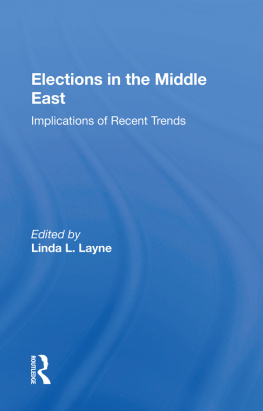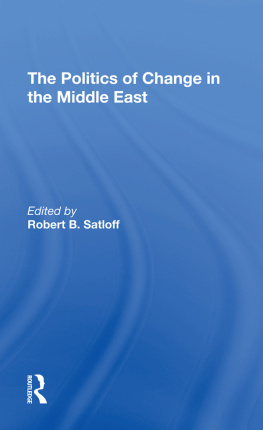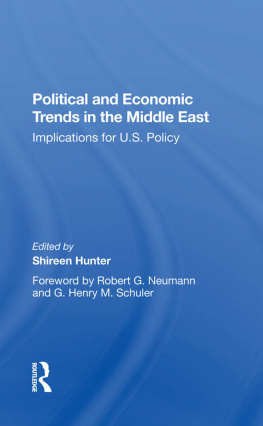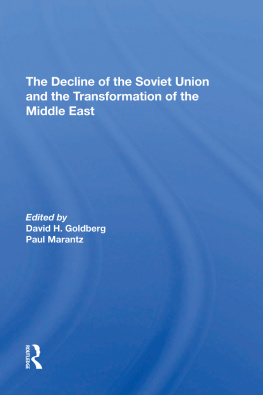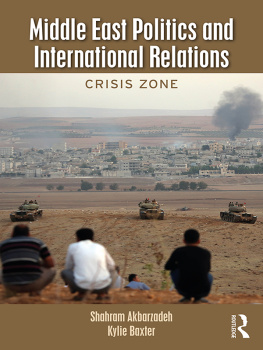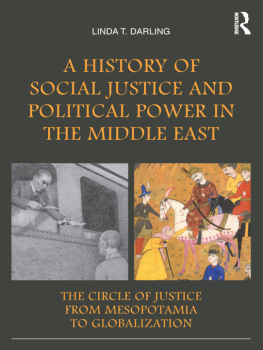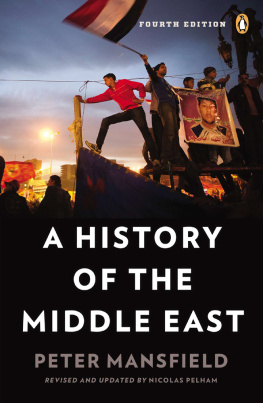Elections in the Middle East
About the Book and Editor
The far-reaching impact of the latest parliamentary elections in the Middle East is examined in this volume. After an introduction that analyzes the trends illustrated by the elections and their implications for regional stability, the book discusses recent elections in Turkey, Egypt, Israel, Jordan, and Kuwait. Individual chapters analyze the influence of pre-1980 patterns in the party system and voting on Turkeys 1983 election; the balloting in Egypts 1984 election as a turning point toward democratization in contemporary Egyptian politics; the significance of Israels 1984 election in view of the relatively small differences in objectives between Israels right wing Likud and the centrist Labor party; the role of traditional tribal influences and new political factions in Jordans 1984 elections; and the influence of newly emerging social groups in Kuwaits 1985 election. The contributors discuss differences in party programs and platforms, the extent of control by elites, and the relevance of the elections to crucial economic and social problems and political stability.
Linda L. Layne is a lecturer in anthropology at Princeton University.
First published 1987 by Westview Press
Published 2021 by Routledge
605 Third Avenue, New York, NY 10017
2 Park Square, Milton Park, Abingdon, Oxon OX14 4RN
Routledge is an imprint of the Taylor & Francis Group, an informa business
Copyright 1987 Taylor & Francis
All rights reserved. No part of this book may be reprinted or reproduced or utilised in any form or by any electronic, mechanical, or other means, now known or hereafter invented, including photocopying and recording, or in any information storage or retrieval system, without permission in writing from the publishers.
Notice:
Product or corporate names may be trademarks or registered trademarks, and are used only for identification and explanation without intent to infringe.
Library of Congress Catalog Card Number: 85-51183
ISBN: 0-8133-0298-6
ISBN 13: 978-0-3670-0647-1 (hbk)
ISBN 13: 978-0-3671-5634-3 (pbk)
DOI: 10.4324/9780429036330
CONTENTS
, Linda L. Layne
2 Restoration of Democracy in Turkey? Political Reforms and the Elections of 1983, Ustun Erguder and Richard I. Hofferbert
3 The May 1984 Elections in Egypt and the Question of Egypts Stability, Richard U. Moench
4 Israels Eleventh Knesset Election, Don Peretz and Sammy Smooha
5 Tribesmen as Citizens: Primordial Ties and Democracy in Rural Jordan, Linda L. Layne
6 Tribal Democracy: The Anatomy of Parliamentary Elections in Kuwait, Nicolas Gavrielides
- 2 Restoration of Democracy in Turkey? Political Reforms and the Elections of 1983
- 3 The May 1984 Elections in Egypt and the Question of Egypts Stability
- 4 Israels Eleventh Knesset Election, Don Peretz and Sammy Smooha
- 5 Tribesmen as Citizens: Primordial Ties and Democracy in Rural Jordan
- 6 Tribal Democracy: The Anatomy of Parliamentary Elections in Kuwait
Guide
TABLES
2.1 Party Performance in Turkish National Assembly Elections, 19651977
2.2 Structure of Turkish Party System: Factor Analysis of Party Performance, 19651977
2.3 Relationship Between 1983 Election and Prior Patterns: Sixty-Seven Turkish Provinces
3.1 Maglis al-Shaab Election Results
4.1 Estimate of Knesset Seats by Modeen Ezrachi and Dahaf
4.2 Number of Seats Forecast for Likud and Alignment, Difference Between Them, and Sum of Their Votes
4.3 Ethnic Voting Patterns
4.4 Arab Vote for Parties by Percentages
4.5 1984 Election Results
5.1 Election Results from Selected Sub-districts in the Balqa Governorate
6.1 Kuwaits Old Voting Districts and Social Groups
6.2 Kuwaits New and Old Election Districts
6.3 Members of Kuwaits 1981 Parliament
6.4 Tribal Concentration in Tribal Voting Districts
6.5 Members of Parliament by Tribal Group, 19631985
FIGURES
5.1 Administrative Map of Jordan (1972)
5.2 Balqa Governorate with Subdistricts
6.1 Residential Patterns in Kuwait
The chapters on Egypt, Israel, Jordan, and Turkey were first presented as part of a session Recent Middle East Elections: Implications for Instability organized by Don Peretz and held at the Eighteenth Annual Meeting of the Middle East Studies Association, San Francisco, November 28th through December 1st, 1984. The chapter on Kuwait was added later.
The chapters vary in emphasis and approach. Each was written independently and the authors are trained in a number of different fields (anthropology, sociology and politics). Three of the chapters (Egypt, Jordan and Kuwait) were written by anthropologists. As a result, they not only seek to interpret the elections per se, but use the elections as vehicles with which to attain a greater understanding of the workings of the culture and society as a whole. Al though neither Moench nor Gavrielides were able to observe firsthand the elections about which they write, their in-depth knowledge of Egypt and Kuwait affects the type of questions each asks and adds richness to their interpretations. Because elections generate large amounts of quantitative data, electoral behavior is assumed to be particularly amenable to comparative analysis. While such statistical comparisons between nations can be hazardous, ridden as they are by exclusion of un-quantifiable social and cultural differences, Erguder and Hofferbert make excellent use of statistical materials to study difference within Turkey.
I am indebted to Don Peretz for the opportunity to edit this volume. I would also like to thank the authors for their cooperation and patience and to express my gratitude to Beth Shally, Mary Taylor Huber and Bernard Wilson for their assistance.
L.L.L.
Chapter I
INTRODUCTION
Linda L. Layne
DOI: 10.4324/9780429036330-1
Of the institutions of democratic states, elections are among the most prominent in manifesting political participation and bringing about or legitimating change in political regimes. It is elections that give political leaders the most direct and obvious incentive to take note of the wishes and views of ordinary people. This book discusses the elections which took place in 1983, 1984, and 1985 in five Middle Eastern countries. These papers do more than simply report election results. In addition to interpreting the outcomes of these particular elections, the contributors seek to understand the meaning of the electoral systems within these societies. While each of the five electoral systems described in this book resemble those of the west, each has developed and been affected by local traditions. Many of these essays challenge familiar assumptions based on western experience and question the appropriateness of western political models when seeking to understand the elections of Middle Eastern nations. Those interested in explaining the outcomes of elections, ascertaining the content of any mandates issued to winning candidates, gauging the decisiveness of victory or defeat, and assessing the type of judgments that enter into voting, must take into account the particularities of the history and development of each electoral system and the structure and culture of the societies of which they are a part. In addition to the laws and mechanisms of voting, the character, attitudes and behavior of the voters and the elected in each society vary. The problems facing these states varies, and these differences find expression in the electoral laws and campaigns and in the composition and character of the elected assemblies. Efforts to understand why formally similar political institutions perform differently in different societies inevitably leads one away from a strictly political focus to consideration of the wider aspects of each society.

